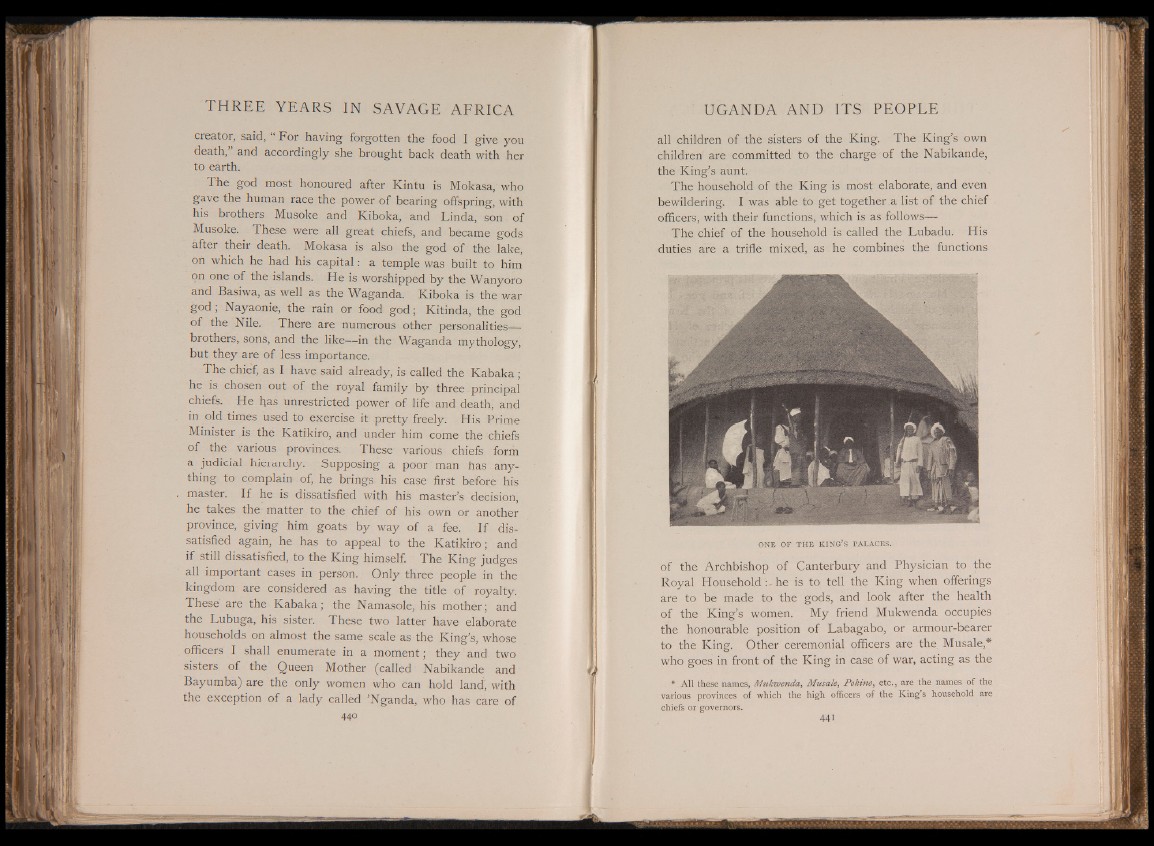
creator, said, “ For having forgotten the food I give you
death,” and accordingly she brought back death with her
to earth.
The god most honoured after Kintu is Mokasa, who
gave the human race the power of bearing offspring, with
his brothers Musoke and Kiboka, and Linda, son of
Musoke. These were all great chiefs, and became gods
after their death. Mokasa is also the god of the lake,
on which he had his capital: a temple was built to him
on one of the islands. He is worshipped by the Wanyoro
and Basiwa, as well as the Waganda. Kiboka is the war
god, Nayaonie, the rain or food god; Kitinda, the god
of the Nile. There are numerous other personalities—
brothers, sons, and the like—in the Waganda mythology,
but they are of less importance.
The chief, as I have said already, is called the Kabaka;
he is chosen out of the royal family by three principal
chiefs. He has unrestricted power of life and death, and
in old times used to exercise it pretty freely. His Prime
Minister is the Katikiro, and under him come the chiefs
of the various provinces. These various chiefs form
a judicial hierarchy. Supposing a poor man has anything
to complain of, he brings his case first before his
master. I f he is dissatisfied with his master’s decision,
he takes the matter to the chief of his own or another
province, giving him goats by way of a fee. I f dissatisfied
again, he has to appeal to the Katikiro; and
if still dissatisfied, to the King himself. The King judges
all important cases in person. Only three people in the
kingdom are considered as having the title of royalty.
These are the Kabaka; the Namasole, his mother; and
the Lubuga, his sister. These two latter have elaborate
households on almost the same scale as the King’s, whose
officers I shall enumerate in a moment; they and two
sisters of the Queen Mother (called Nabikande and
Bayumba) are the only women who can hold land, with
the exception of a lady called ’Nganda, who has care of
440
all children of the sisters of the King. The King’s own
children are committed to the charge of the Nabikande,
the King’s aunt.
The household of the King is most elaborate, and even
bewildering. I was able to get together a list of the chief
officers, with their functions, which is as follows—
The chief of the household is called the Lubadu. His
duties are a trifle mixed, as he combines the functions
ONE OF THE KING’ S PALACES.
of the Archbishop of Canterbury and Physician to the
Royal Household':-he is to tell the King when offerings
are to be made to the gods, and look after the health
of the King’s women. My friend Mukwenda occupies
the honourable position of Labagabo, or armour-bearer
to the King. Other ceremonial officers are the. Musale,*
who goes in front of the King in case of war, acting as the
* All these names, Mukwenda, Musale, Pokino, etc., are the names of the
various provinces of which the high officers of the King’s household are
chiefs or governors.